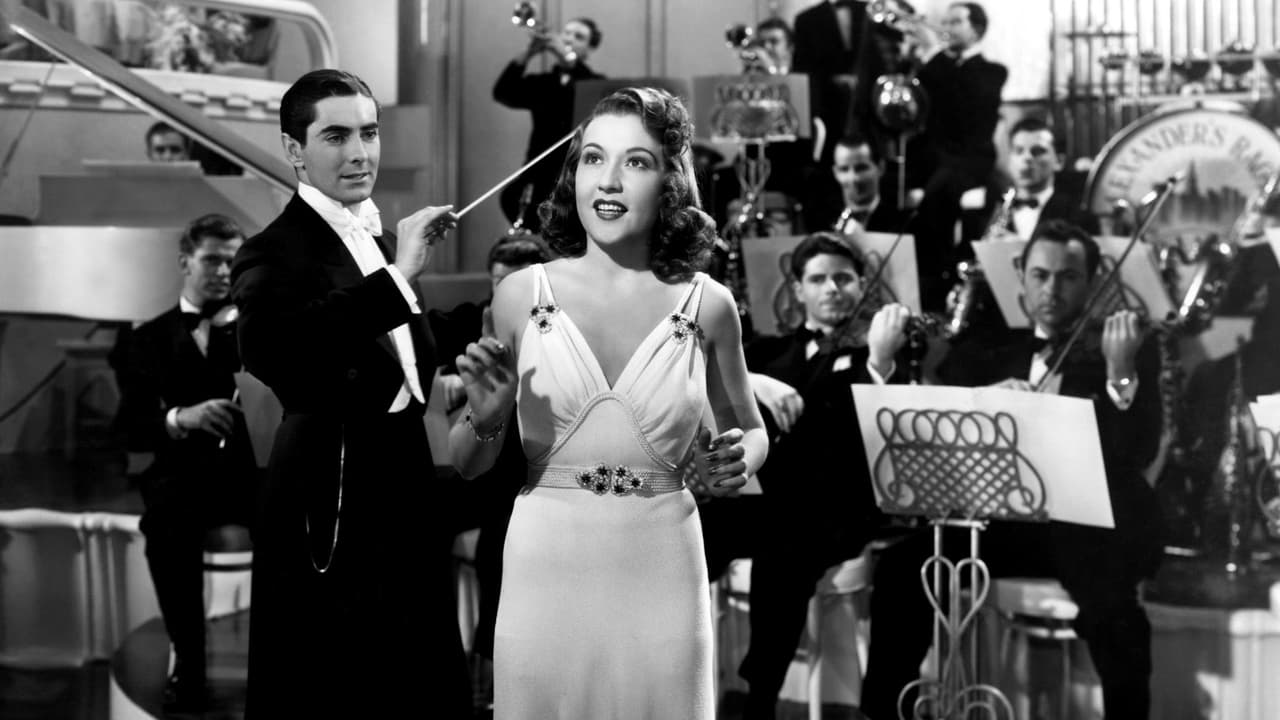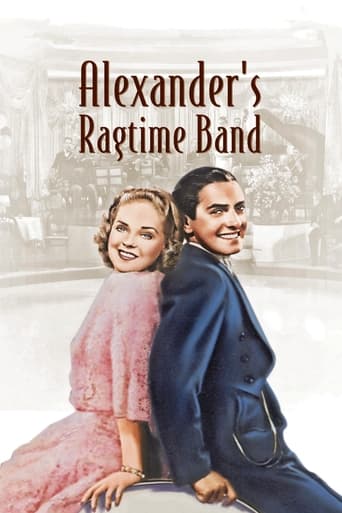

the leading man is my tpye
... View MoreGood idea lost in the noise
... View MoreThe movie turns out to be a little better than the average. Starting from a romantic formula often seen in the cinema, it ends in the most predictable (and somewhat bland) way.
... View MoreStory: It's very simple but honestly that is fine.
... View MoreTyrone Power gorgeous, and scrumptious, etc. Alice Faye with her wonderful, throaty voice, is always a reminder of her signature voice range. A youngish Ethel Merman was a surprise to see here, and a wonder that they kept her to the second part of the movie. Don Ameche is just gorgeous, too.Jack Haley a fabulous dancer, and I know that the next year he performed as the Tin Woodman in "Wizard of Oz", also an ensemble picture like this one.I really liked the constant barrage of songs written by Irving Berlin. That boy was really a prolific composer.Power was good as an actor when his character went to World War I, later coming home with a changed demeanor and denying that his walking cane was from any war injury. He seemed to be more serious than before. In the beginning of the movie, he was a classical music performer who later lightened up and began playing the newly-popular pre-war ragtime music.I did enjoy seeing Alice Faye and Ethel Merman singing together toward the end of the movie. This was a treat that I do not recall seeing in any other movie. Their low and higher voices actually complemented each other. That they were each interested in the same man did not seem to really matter.In this movie, Ethel was not as recognizable as in later movies in which she would appear, full-figured, in such song-belting movies as "There's No Business Like Show Business" and "Call Me Madam". She was great in those movies, as well as this one, however.I do enjoy seeing this movie, over and over again. I see different nuances every time.
... View MoreFor viewers who like Irving Berlin music, this is a film to watch. His songs are really the main attraction. But the story, which encompasses a group of musicians and their career changes, has an interesting series of romantic plot twists that is intriguing.The main character is Roger (Tyrone Power), a man who starts his career in a highbrow musical setting, but changes to more popular ragtime. The story is fictional, but Roger's character arc is inspired by the life of Irving Berlin.A big-budget film that was in production for almost two years, "Alexander's Ragtime Band" received a huge promotional build-up in 1938. And it was well received by audiences. Sets are lavish. B&W cinematography is competent. Casting and acting are acceptable overall. However, Tyrone Power is the only major actor who lacks musical talent, and it shows. Both Don Ameche and Jack Haley add luster. Alice Faye is adequate.The film is less constricted by plot than other musicals. But there's still a lot of dialogue. And, except for the title song and a quick version of "Easter Parade", the music is somewhat bland and uninteresting. I would have preferred more evocative music. The film's tone ranges from semi-bawdy to mushy romanticism.This is a large-scale, Americana period piece film, with an accent on the music of Irving Berlin. It is old fashioned, both in plot and in style. It's technically well made. But to me it's too removed in time from current culture to be anything other than historically quaint.
... View MoreI wouldn't want to put money on it, but I'm willing to say there must be at least 25 Irving Berlin songs in Alexander's Ragtime Band. This was the first of those Irving Berlin extravaganzas where a history of an era was told with his music, the others being Blue Skies and There's No Business Like Show Business. After what happened to his score in Reaching for the Moon, Berlin demanded and got complete control in every film that he wrote or supplied the music for. And you will not hear one note of any other composer's music. Just listen to the background music and you'll see what I'm talking about.The song Alexander's Ragtime Band is considered Berlin's first big popular hit and so a story was constructed around a group of itinerant musicians who when they hire girl singer Alice Faye make a huge hit with the selfsame Alexander's Ragtime Band. So the film is about the lives and loves of Faye, Tyrone Power, Don Ameche, Ethel Merman, Jack Haley, etc. for an over quarter of a century. Except for Power, all these other folks are real talented musically and they contribute vocally with a lot of Irving Berlin old favorites. And Alice Faye and Don Ameche both sang a new tune Berlin wrote for this film, Now It Can Be Told. Faye's version is especially grand, one of her best movie songs.Tyrone Power one of the finest of leading men in old Hollywood was unfortunately not blessed with a singing voice. Just hear him on a few bars of another Irving Berlin song in Second Fiddle and you'll see what I mean. He leads the band and it looks a bit ridiculous for him to be doing that and watching the others perform.This film is the reason I've been long convinced that Darryl F. Zanuck hired John Payne, an actor who looked somewhat like Power and could contribute musically in films with Faye, Betty Grable and the rest of Fox female musical ladies.Of course anyone who really loves Irving Berlin's music will watch this film and won't quibble about Tyrone Power not singing.
... View MoreRoger Grant, a classically trained violinist, is leading a small band in turn of the century San Francisco with little success. One fateful night, Stella Kirby, brings sheet music of Irving Berlin's new song, Alexander's Ragtime Band. Stella sings while Roger plays the song, and all three are a hit, despite the friction between Roger (who now is the Alexander from the song) and Stella. Obviously there is hints of romance between the two, but fellow band member Charlie Dwyer completes the love triangle, and is the one who captures Stella's hand in marriage. Roger/Alexander and his band tour the country and entertain the troops overseas in World War I, and returns to the US a sensation, while the marriage between Stella and Charlie falls apart because the two realize they are not the ones meant for each other. Stella tries to rekindle the romance with Roger, but singer Jerry Allen has fallen for the band leader, despite being somewhat indifferent towards her. Roger, Charlie, and the rest of the band perform a concert reuniting everyone, while Stella feels on the outside thinking she has no part in Roger's life. The film's story line is predictable, full of holes, and mushy and the performances are enjoyable at best, but the film carries such an energy thanks to Berlin's music, as well as the singing from both Faye and Merman (who does stand out in this early role). The musical numbers are quite different from the ones preceding it, which does keep the movie fresh. Rating, 7.
... View More